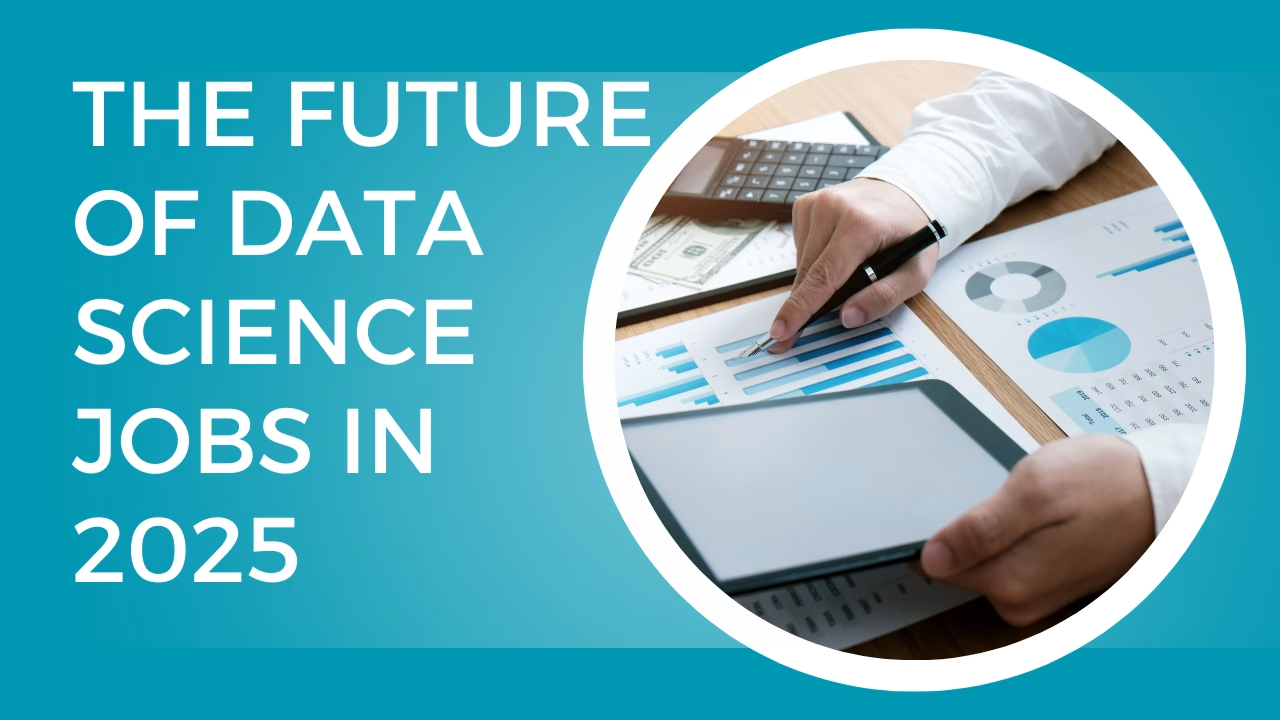The Future of Data Science Jobs in 2025: What You Need to Know

Data science is transforming industries, and by 2025, it will be even more integral to how businesses operate. As AI, machine learning, and big data continue to evolve, the job landscape for data scientists will shift in exciting ways. Here’s a look at what the future holds for data science jobs and how you can prepare for it.
AI and Automation: The Future Helpers, Not Replacers, of Data Scientists
AI and automation are already making waves in data science, and by 2025, they’ll be key players in improving productivity. While AI tools will take care of repetitive tasks like cleaning data and building basic models, human data scientists will remain essential for interpreting insights and making critical business decisions. AI ethics will also become more important as companies need to ensure their AI models are transparent and fair.
Data Explosion: A Golden Age for Data Engineers
By 2025, the amount of data generated globally will grow at an unprecedented rate. With data coming from billions of devices and systems, businesses will need skilled data engineers to manage the storage, processing, and accessibility of this vast information. Data engineers will be in high demand, especially those who are skilled in cloud technologies like AWS, Google Cloud, and Azure. These engineers will play a crucial role in setting up the data infrastructure that makes advanced analysis possible.
The Rise of Specializations: Your Path to Becoming a Niche Expert
As the data science field matures, more specialized roles will emerge. Data scientists won’t just be generalists—they will need to master specific niches, such as:
- Natural Language Processing (NLP): NLP will be crucial for technologies like chatbots, voice assistants, and sentiment analysis. Data scientists with NLP expertise will be in demand across industries such as customer service and healthcare.
- Computer Vision: From self-driving cars to medical imaging, computer vision is growing fast. Data scientists specializing in this field will be needed to help machines understand and interpret visual data.
- MLOps: As machine learning models become more central to business, there will be a growing demand for professionals who specialize in deploying, monitoring, and maintaining those models in real-world environments.
- Data Visualization and Business Intelligence: Data scientists who can turn complex data into clear, actionable insights through visual storytelling will be in high demand as companies focus on making data-driven decisions.
Soft Skills Matter: Why Communication is the New Superpower
While technical skills are essential, soft skills will become just as important in the future of data science. By 2025, data scientists will need to work closely with people from various business functions. Effective communication will be key to explaining complex findings and insights in simple terms. The ability to tell stories with data—making insights compelling and actionable—will be a powerful skill that differentiates great data scientists from good ones.
Remote Work Revolution: Data Science Goes Global
The shift toward remote work, accelerated by the COVID-19 pandemic, will be here to stay. By 2025, data scientists will increasingly work remotely, offering them the flexibility to collaborate with teams around the world. This global approach will allow businesses to tap into a wider talent pool, creating more opportunities for data scientists to work on diverse and exciting projects. As a result, you’ll need to be self-motivated and ready to adapt to remote collaboration tools.
Must-Have Skills to Stay Ahead in Data Science
As technology evolves, so too will the skills needed to thrive in the data science field. Some key skills to focus on for 2025 include:
- Programming Mastery: Being proficient in programming languages like Python, R, and SQL will still be foundational. Experience with machine learning libraries and frameworks like TensorFlow and PyTorch will be crucial.
- Cloud Computing Knowledge: Understanding cloud platforms (AWS, Azure, Google Cloud) will be essential as more businesses move their data operations to the cloud.
- Data Ethics Expertise: As privacy laws and regulations tighten, data scientists will need to navigate the ethical complexities of data collection, analysis, and usage.
- Problem-Solving and Business Insight: The future of data science isn’t just about technical skills—it’s about using data to solve real-world business challenges. Understanding the business context and making data actionable will set top professionals apart.
Conclusion: The Bright Future of Data Science
By 2025, data science will continue to be one of the most dynamic and rewarding fields, with new opportunities on the horizon. With AI, automation, and cloud technology reshaping the landscape, data scientists will need to stay flexible and adaptable. While technical skills will always be important, soft skills like communication and collaboration will become equally crucial. Specializing in niche areas, understanding the business context, and being proactive about learning new tools will help you succeed in this exciting field.
The future of data science offers many exciting possibilities for those willing to stay ahead of the curve. Whether you’re just starting out or looking to advance your career, now is the time to build the skills that will keep you competitive in this fast-evolving field.
If you want to explore the blogs like this, click here
FAQ: The Future of Data Science Jobs in 2025
1. Will AI replace data scientists by 2025?
No, AI will not replace data scientists by 2025. While automation tools will handle repetitive tasks like data cleaning and model building, data scientists will still be essential for interpreting results, solving complex problems, and ensuring AI models are ethical and transparent.
2. What will data scientists focus on in 2025?
Data scientists in 2025 will focus on specialized areas like machine learning model deployment (MLOps), natural language processing (NLP), computer vision, and data visualization. They will also need to be great communicators and storytellers to share insights with non-technical teams.
3. What skills will be most in demand for data scientists in 2025?
In 2025, data scientists will need strong programming skills in languages like Python and R, cloud computing expertise (AWS, Azure, Google Cloud), knowledge of data ethics, and the ability to work cross-functionally to solve business problems. Communication and problem-solving will also be highly valued.
4. Can I work remotely as a data scientist in 2025?
Yes! The trend toward remote work is expected to continue, and by 2025, many data science jobs will offer remote or hybrid work options. Data scientists will be able to collaborate with global teams, providing more opportunities to work with international companies.
5. How can I prepare for a data science career in 2025?
To prepare for a data science career in 2025, focus on mastering programming languages, learning about AI and machine learning, building skills in cloud computing, and staying up-to-date on data privacy laws. Don’t forget to work on your communication and business acumen to better convey data insights to decision-makers.




